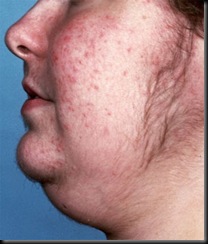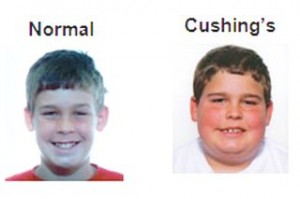Cushing Syndrome is experienced when body of a susceptible individual is exposed to significant degree of hormone cortisol for a considerably longer time. Cushing’s syndrome is also sometimes referred to as Hypercortisolism. One of the common causes of Cushing syndrome is known to be orally administered corticosteroid medicines. This conditions may also afflict when the body naturally produces too much of cortisol.
Cushing Syndrome Pictures
Have a look at these pictures of patients affected with Cushing Syndrome.
There are certain common signs and symptoms of Cushing syndrome, these symptoms may include hump of fats developed between shoulders, protruded and rounded face and pink or violet marks visible on skin. In some cases the afflicted individual may also experience high blood pressure or hypertension, bone issues and, in very few cases, diabetes.
Cushing Syndrome – Causes:
As explained above Cushing syndrome may be caused due to excess level of cortisol hormone present in the body. The body houses an endocrine system which in turn consists of hormone producing glands; these glands are also responsible for producing cortisol. Glands consisted in the endocrine system includes, pituitary gland, pancreas, thyroid and parathyroid gland, adrenal glands, etc. These glands also include ovaries in case of female body and testicles in case of male body.
Among these glands, the gland that is directly responsible for production of cortisol is the adrenal gland. Cortisol plays some of the important roles in your body, including managing blood pressure as well as ensuring the proper functioning of cardiovascular system. Though this hormone is essential for appropriate functioning of certain physical system, excess prevalence of cortisol may lead to Cushing syndrome.
Corticosteroids causing Cushing Syndrome:
Cushing syndrome may also result out of factors that are not internal (or not inside your body); such conditions are known as exogenous Cushing syndrome. For example, corticosteroids are medicines prescribed to patients with certain physical issues such as asthma, lupus erythematosus and rheumatoid arthritis, or disease specially related to deficiency of cortisol. When these medicines are taken much more than required, through extended time, may lead to Cushing syndrome. These medications are as influential as natural cortisol produced by the body.
In some cases these medications may be prescribed in case you underwent a transplant surgery and your body is rejecting to accept the transplanted organ. Since, the daily dosage required to treat such conditions are higher as your body requires more cortisol, the level of cortisol may increase in your body leading to Cushing syndrome. It is not only due to oral corticosteroids but also due to corticosteroid injections that this syndrome affects the patients.
Endogenous Cushing Syndrome:
Cushing syndrome may also be caused due to natural production of cortisol in the body as mentioned above. This condition is known as endogenous Cushing syndrome. Endogenous Cushing syndrome may be related to following factors:
• Tumor of Pituitary gland:
A benign or noncancerous pituitary gland tumor, which is situated at the bottom of the brain, secretes significant amount of ACTH or adrenocorticotropic, which is responsible for regulating cortisol. This may in turn stimulate adrenal glands to produce even more cortisol. This condition is frequently diagnosed in women than men.
• ACTH secreting tumor:
In rare cases, when a tumor develops in body organ which does not secret ACTH, the tumor may then start producing cortisol again leading to Cushing Syndrome. These tumors can be cancerous or benign and are usually found in organs such as pancreas, thyroid gland, thymus gland and region of lung.
• Adrenal gland:
As mentioned above endogenous Cushing syndrome may result out of excessive secretion of cortisol hormones from adrenal gland. Adrenal gland does not need any stimulation from ACTH to secrete cortisol. Adrenal gland may either of the types, cancerous tumor or non cancerous tumor, which may lead to excessive production of cortisol.
Symptoms of Cushing syndrome:
Similar to other diseases even, Cushing syndrome may show some signs and symptoms; however, these symptoms may vary. Some of the common signs or symptoms of Cushing syndrome are:
• Dramatic increase in weight
• Deposition of fatty tissues, between shoulders, face and midsection of beck
• Thin or brittle skin that is easily damageable
• Pink or violet rashes on skin, especially around breast, arms, stomach and thighs
• Reduced immunity or slow healing of wounds, infections and bites
• Notable acne
• Weakness of muscles
• Tiredness
• Depression and worry
• Irritability
• Cognitive issues
• Stimulation of Hypertension
• Headaches
• Bone issues that may make you susceptible to fracture
Cushing syndrome symptom in women:
Women under the influence of Cushing syndrome may experience hirsutism wherein they may notice prominent hair on face and body. In some cases women may also suffer from irregular or missed menstrual cycle.
Cushing syndrome symptoms in men:
Men suffering from Cushing syndrome may experience sexual issues such as decreased level of libido. A man may also become infertile and unable to become a father. Cushing syndrome in men may also lead to widely threatened sexual disability in men known as erectile dysfunction or male impotence.
Cushing syndrome treatment:
There are different types of Cushing syndrome treatments. Some of such treatments are mentioned below.
Decreasing use of corticosteroid:
Since it is known that Cushing Syndrome is majorly regulated by the level of cortisol (increased cortisol level), it is essential to reduce and control the cortisol level in the body. Consult your doctor and try to determine the level of cortisol in your body. If your doctor indicates increased cortisol level then you should avert use of cortisol based medication and ask your doctor to prescribe non- corticosteroid medications.
Surgery and radiation:
These are other two techniques that may help in curing the condition. Based on the severity of the condition your doctor may suggest you a surgical treatment for removing tumor or radiation may be suggested to reduce cortisol level.
Medications:
Medications can be prescribed by the doctor either before surgery (to control symptoms) or after surgery. There are drugs such as Metoprione, Lysodren and Nizoral etc, which are effective in treating the disease.
It is essential to understand the symptoms of Cushing syndrome. If any of the abovementioned symptoms or signs are noticed it is essential to seek immediate medical assistance and determine the issue. If it turns out to be Cushing syndrome then ensure to undergo immediate Cushing syndrome treatment.



obviously like your web site however you need to check the spelling on several of your posts. Several of them are rife with spelling problems and I find it very troublesome to inform the reality however I抣l certainly come again again.